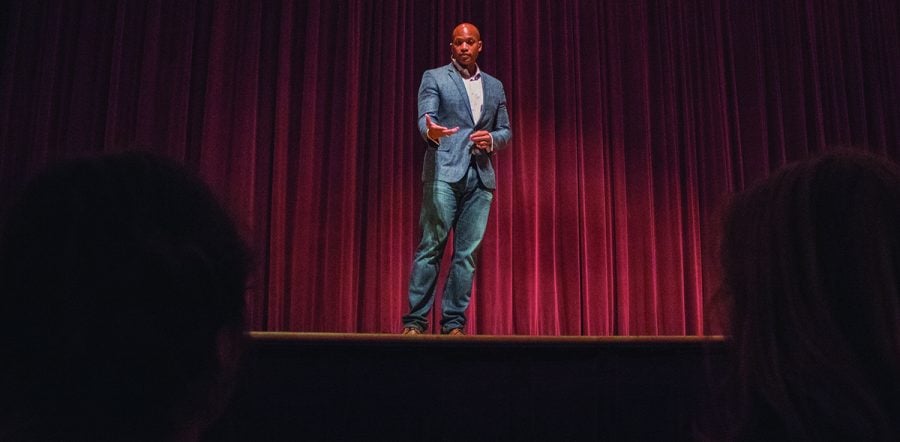Moore speaks about “The Other Wes Moore”
“There are Wes Moores in every one of our communities, every one of our schools,” said Wes Moore during his presentation at Guilford on Nov. 9.
Moore is the author of “The Other Wes Moore: One Name, Two Fates,” a book that all Guilford first-years were required to read as an assignment for their FYS and FYE classes. It focuses on the themes of the potential of youth and the advantages of self-evaluating. Moore addressed these themes in his presentation.
“Potential in our communities is universal, and opportunity is not,” Moore said.
Moore develops this idea through his nonfiction book, which follows two children with the same name who, though born only blocks apart, end up leading radically different lives. One of the characters is based on the author and the other on a friend of his who is serving a life sentence in prison.
“It seems so appropriate that the book was (titled) ‘The Other Wes Moore,’” said President of Guilford College Jane Fernandes.
She feels that the book is emblematic of Guilford.
“Even though we live in a small space, there is a great distance between us,” Fernandes said.
Students who attended the event also found value in Moore’s presentation.
“I like the fact that he addressed how poverty and how much the progression of someone’s life is not an accident, (but) because of the policies and decisions and priorities we’ve made,” said Amy Mejia, a first-year political science and German major. “He’s part of what I consider people on ‘The Justice League.’ People who are excited about changing and creating solutions in the world.
“Not only is his book a call to action, but it’s also a lens for people who don’t have this same perspective.”
First-year and creative writing major Cynthia Torres also enjoyed Moore’s presentation.
“I just thought it was cool to meet the author of the book we were assigned to read because it’s a really compelling novel,” said Torres. “I love how he emphasized that you don’t have to be political to make social change.”
Moore believes that social change comes most easily from those with social power, but that those in power tend to shy away from using their influence.
“Truth is, when some people reach a level of credibility they get real quiet,” Moore said. “Just because of the weight your degree carries and the intelligence that comes from school, people will listen to you. I just ask that you use it.”
Moore is the CEO of the nonprofit organization Robin Hood, an anti-poverty fund based in New York that seeks to improve the lives of 1.8 million low-income New Yorkers.
He left the audience with a final question that focused on social responsibility.
“The most important question you’re going to be asked is not ‘what did you study?’” said Moore. “But … ‘who did you advocate for?’ and ‘who did you fight for when it wasn’t easy?’”









